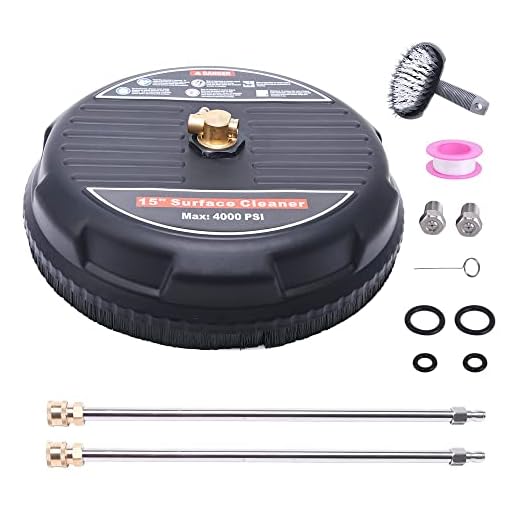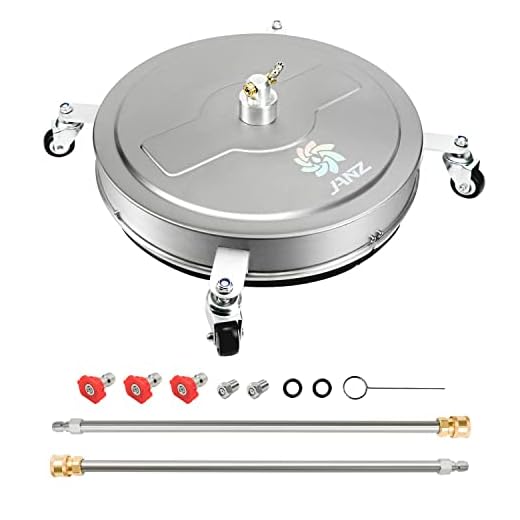Blog
Can You Run Bleach Through A Pressure Washer

Pressure washers are a powerful tool for cleaning various surfaces, from patios and driveways to vehicles and outdoor furniture. They work by using high-pressure water to remove dirt, grime, and other substances. But what about using bleach in a pressure washer?
It’s a question that often comes up when tackling tough stains or mold and mildew. While bleach can be an effective cleaner, it’s important to know if it can be safely used in a pressure washer.
The short answer is yes, you can run bleach through a pressure washer. However, there are a few things to keep in mind to ensure both the effectiveness of the bleach and the safety of the pressure washer:
- Dilution: Bleach should always be diluted before using it in a pressure washer. The recommended ratio is typically one part bleach to ten parts water. This is important to prevent damage to surfaces and to ensure the bleach is not too concentrated.
- Compatibility: It’s essential to check if the pressure washer manufacturer approves the use of bleach. Some pressure washers may have specific guidelines or limitations on what can be used with them to avoid damage to the machine.
- Protective gear: When using bleach, it’s important to protect yourself by wearing appropriate safety gear, such as gloves and goggles. Bleach can be irritating to the skin and eyes, so taking proper precautions is crucial.
Using bleach in a pressure washer can be an effective way to clean and disinfect surfaces. However, it’s essential to follow the manufacturer’s guidelines and take necessary precautions to ensure safety and prevent damage to both the pressure washer and the surfaces being cleaned.
Always remember to test a small, inconspicuous area first to ensure the bleach doesn’t cause any unwanted damage. With proper care and caution, you can achieve excellent cleaning results with a bleach and pressure washer combination.

Is It Safe to Run Bleach Through a Pressure Washer?
Using a pressure washer can be a great way to clean and sanitize outdoor surfaces. When it comes to cleaning agents, one common question that arises is whether it is safe to run bleach through a pressure washer. While bleach can be an effective cleaner, it is important to consider a few factors before deciding to use it in your pressure washer.
The Benefits of Using Bleach in a Pressure Washer
Bleach can be a powerful cleaning agent due to its ability to kill bacteria, viruses, and other microorganisms. It is particularly effective at removing mold, mildew, and algae. When used correctly, bleach can help restore the appearance of surfaces and improve their overall cleanliness.
Additionally, using bleach in a pressure washer can save time and effort. The high-pressure spray of the washer, combined with the sanitizing power of bleach, can make quick work of tough stains and grime. This can be especially useful for cleaning outdoor surfaces such as decks, fences, and siding.
Potential Risks and Precautions
While bleach can be effective in a pressure washer, there are some potential risks to be aware of. First, bleach is a corrosive substance and can damage certain materials, such as wood, metal, and certain types of paint. It is important to read and follow the manufacturer’s instructions for both the pressure washer and any cleaning agents used.
Another consideration is the potential harm that bleach can cause to plants and the environment. Bleach is toxic to many plants and can harm aquatic life if it enters waterways. It is important to avoid using bleach near plants or bodies of water, and to take precautions to prevent runoff into storm drains or streams.

When using bleach in a pressure washer, it is important to dilute it properly according to the manufacturer’s instructions. Using too much bleach can be harmful to surfaces and may not necessarily improve cleaning effectiveness. It is also important to wear protective gear, such as goggles and gloves, to prevent skin and eye irritation.
Alternatives to Using Bleach
If you are concerned about the potential risks of using bleach in a pressure washer, there are alternative cleaning agents available. There are commercial pressure washer detergents specifically formulated for use with pressure washers, which can be effective for cleaning a variety of surfaces. Additionally, there are eco-friendly options available that are safe for plants and the environment.
Ultimately, the decision to use bleach in a pressure washer should be based on a careful assessment of the specific cleaning needs and the potential risks involved. It is important to weigh the benefits and risks and make an informed decision to ensure safe and effective cleaning.
The Potential Risks of Using Bleach in a Pressure Washer
Bleach can be a useful cleaning agent in various household tasks, but using it in a pressure washer comes with several potential risks that need to be considered.
1. Damage to surfaces: Bleach is a highly corrosive substance that can cause damage to many types of surfaces, including wood, paint, and certain metals. When used in a pressure washer, the force of the water can intensify this corrosive effect, leading to irreversible damage.

2. Safety hazards: Using bleach in a pressure washer can create safety hazards, especially if the bleach comes into contact with other cleaning chemicals. The mixture of bleach with ammonia or other acids can produce toxic fumes that can be harmful to inhale. It is important to carefully read and follow all safety instructions provided by the manufacturer.
3. Environmental concerns: Bleach is a powerful chemical that can have adverse effects on the environment. When used in a pressure washer, the bleach can be dispersed into the air or carried by the wastewater into nearby bodies of water. This can harm plants, animals, and aquatic life.
It is always recommended to consult the manufacturer’s guidelines and choose alternative cleaning solutions that are specifically designed for pressure washers. These solutions are formulated to be safer for both the surfaces being cleaned and the environment. Additionally, using bleach in a pressure washer may void the warranty of the equipment.
In conclusion, while bleach may be effective for some cleaning tasks, it is not recommended to use it in a pressure washer due to the potential risks involved. It is safer and more environmentally friendly to use cleaning solutions that are specifically designed for pressure washers.
Tips for Safely Using Bleach in a Pressure Washer
Using bleach in a pressure washer can be an effective way to remove tough stains and dirt from a variety of surfaces. However, it’s important to follow safety precautions to protect yourself, others, and the environment. Here are some tips for safely using bleach in a pressure washer:

1. Read the manufacturer’s instructions
Before using bleach in a pressure washer, it’s essential to carefully read and understand the manufacturer’s instructions. This will ensure that you’re using the bleach and the pressure washer correctly.
2. Choose the right bleach
Not all bleaches are suitable for use in a pressure washer. Look for a bleach that is specifically labeled as safe for use with a pressure washer. Additionally, consider using an oxygen bleach, which is less harsh on surfaces and the environment.
3. Dilute the bleach
Bleach is a strong chemical, so it’s crucial to dilute it properly before using it in a pressure washer. Follow the instructions on the bleach bottle or consult the pressure washer manufacturer’s guidelines for the recommended bleach to water ratio.
4. Wear protective gear
Bleach can cause skin irritation and eye damage, so it’s essential to protect yourself while using it in a pressure washer. Wear long sleeves, long pants, gloves, safety goggles, and closed-toe shoes to minimize the risk of exposure.
5. Test a small area first
Before applying bleach to a large surface, test it on a small, inconspicuous area to ensure that it doesn’t cause damage or discoloration. This will help you determine the appropriate dilution ratio and technique for the specific surface.

6. Keep pets and children away
Bleach can be toxic if ingested or inhaled, so it’s important to keep pets and children away from the area where you’re using a pressure washer with bleach. Make sure the area is well-ventilated to minimize exposure to fumes.
7. Rinse thoroughly
After using bleach in a pressure washer, rinse the surface thoroughly with clean water. This will help remove any residual bleach and prevent it from causing damage.
By following these safety tips, you can safely and effectively use bleach in a pressure washer to tackle tough stains and dirt on various surfaces.
Questions and answers
Is it safe to run bleach through a pressure washer?
No, it is not safe to run bleach through a pressure washer. Bleach can cause damage to the internal components of the pressure washer and can also corrode the metal parts. It is recommended to avoid using bleach in pressure washers.
What can happen if I run bleach through a pressure washer?
If you run bleach through a pressure washer, it can cause damage to the seals, O-rings, and other internal components of the machine. The bleach can also corrode the metal parts, leading to potential leaks and malfunctioning of the pressure washer.

Can I use bleach to clean my patio with a pressure washer?
No, it is not recommended to use bleach to clean your patio with a pressure washer. Bleach can cause damage to the pressure washer and can also harm the surrounding plants and vegetation. It is better to use a suitable patio cleaner or detergent specifically designed for pressure washers.
What should I use instead of bleach in a pressure washer?
Instead of bleach, you can use a pressure washer detergent that is specifically designed for use with pressure washers. These detergents are formulated to be safe for the machine and can effectively clean surfaces without causing any damage. Make sure to read the instructions on the detergent bottle and follow the recommended dilution ratios.
Recent Posts
-
How To Connect Soap To Honda Pressure Washer
June 28, 2024 -
A To Z Pressure Washing Scam
June 27, 2024 -
How To Pressure Wash Your Home With A Garden Hose
June 27, 2024 -
Where Can I Buy Honda Pressure Washer Parts
June 25, 2024





